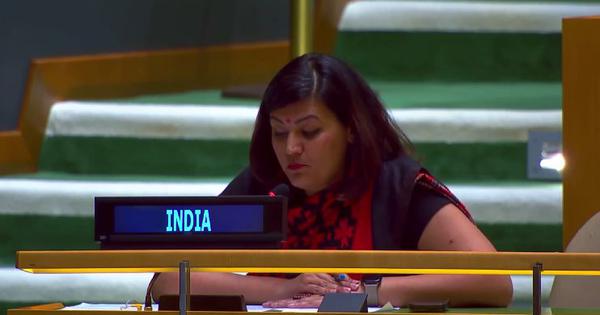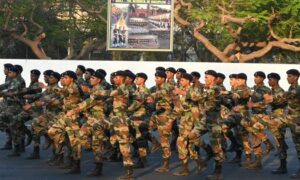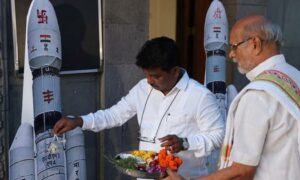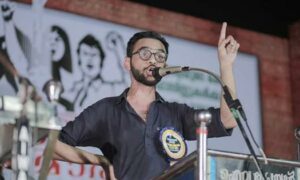
India on Saturday dismissed Pakistani Prime Minister Shehbaz Sharif’s address at the United Nations General Assembly earlier in the day as “absurd theatrics” and accused him of glorifying “terrorism that is so central” to Islamabad’s foreign policy.
The response by Indian diplomat Petal Gahlot came after Sharif accused India of launching “unprovoked aggression” against Pakistan in May, during the general debate of the 80th UN General Assembly in New York.
“The enemy came shrouded in arrogance,” Sharif had said. “We sent them back in humiliation, delivering our bloody nose.”
In response, Gahlot said that “no degree of drama and no level of lies can conceal the facts”, and accused Pakistan of shielding The Resistance Front at the UN Security Council.
She said that the Pakistan-based terror outfit had carried out “the barbaric massacre of tourists” in Pahalgam.
The Resistance Front is an affiliate of the terror group Lashkar-e-Taiba, according to the Indian government. On May 7, New Delhi had said that TRF had claimed responsibility for the Pahalgam terror attack.
The terror attack at Baisaran near Pahalgam town in Jammu and Kashmir on April 22 left 26 persons dead and 16 injured. The terrorists targeted tourists after asking their names to ascertain their religion, the police said. All but three of those killed were Hindu.
“A country long steeped in the tradition of deploying and exporting terrorism has no shame in advancing the most ludicrous narratives to that end,” the Indian diplomat added. “Let us recall that it sheltered Osama bin Laden for a decade, even while pretending to partner in the war against terrorism.”
IndiaAtUN
Watch: India exercises its right of reply at #UNGA80.#IndiaUN80 #UNGA #UN80 #UNGA80@MEAIndia @IndianDiplomacy @PMOIndia @UN pic.twitter.com/qBp2F0ohVt
— India at UN, NY (@IndiaUNNewYork) September 27, 2025
Earlier in the day, Sharif claimed: “India sought to extract political gains from a human tragedy by spurning my sincere offer of an independent international investigation into the Pahalgam incident. Instead, it attacked our cities and targeted our innocent civilians.”
He also repeated the Pakistani claim that several Indian aircraft had been shot down.
Sharif said that Pakistan condemns terrorism “in all its forms and manifestations” and alleged that his country faced threat from groups such as the Tehreek-e-Taliban Pakistan and the Balochistan Liberation Army, which he claimed were “foreign funded groups”.
He also used his address to raise the Kashmir issue, reiterating Pakistan’s support for what he called the Kashmiri people’s “fundamental right to self-determination through an impartial plebiscite under the auspices of the United Nations”.
“India’s tyranny in Kashmir will come to a grinding halt,” the Pakistani prime minister had said.
India, in its reply, dismissed the remarks by Sharif as an attempt to mask Pakistan’s role in sponsoring cross-border terrorism.
Gahlot asserted that “a picture speaks a thousand words” and said that several photos had emerged allegedly showing terrorists killed in the Bahawalpur and Muridke terror camps during Operation Sindoor.
The Indian representative also dismissed the Pakistani prime minister’s account of the recent conflict with India as “bizarre”.
She said that until May 9, Pakistan had been threatening attacks on India but “pleaded with us directly for a cessation to the fighting” on May 10.
“The intervening event was the destruction caused to multiple Pakistani airbases by Indian forces,” Gahlot said. “The pictures of that damage are, of course, publicly accessible. If destroyed runways and burnt-out hangers look like victory, as the prime minister claimed, Pakistan is welcome to enjoy it.”
The Indian diplomat also reiterated India’s long-standing position on the Kashmir issue, saying that it “will be addressed bilaterally” and that “there is no room for any third party in that regard”.
Tensions between New Delhi and Islamabad escalated on May 7 when the Indian military carried out strikes – codenamed Operation Sindoor – on what it claimed were terrorist camps in Pakistan and Pakistan-occupied Kashmir.
The strikes were in response to the Pahalgam attack.
The Pakistan Army retaliated to Indian strikes by repeatedly shelling Indian villages along the Line of Control in Jammu and Kashmir. At least 22 Indian civilians and eight defence personnel were killed in the shelling.
Amid the spiralling tensions, the Indian military struck about a dozen air bases and defence installations in Pakistan on May 10, and claimed to have shot down five Pakistani jets. Hours later, the two countries reached an “understanding” to halt firing.
India has acknowledged that it incurred aircraft losses during the initial phase of the conflict, although the number has not been disclosed yet. The Pakistani military claims that it shot down several Indian aircraft. The claims made by Islamabad have not been independently verified.
📰 Crime Today News is proudly sponsored by DRYFRUIT & CO – A Brand by eFabby Global LLC
Design & Developed by Yes Mom Hosting






